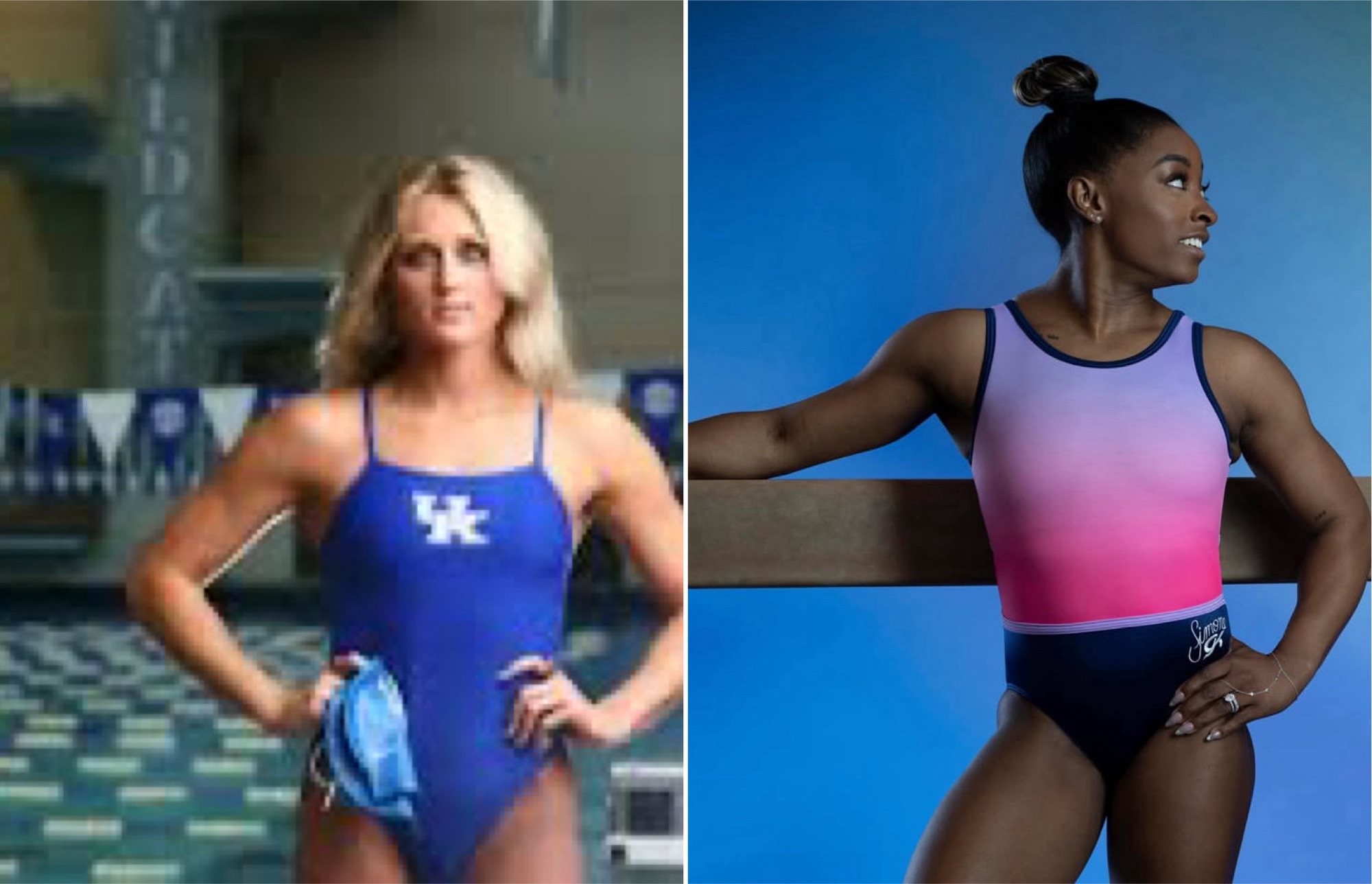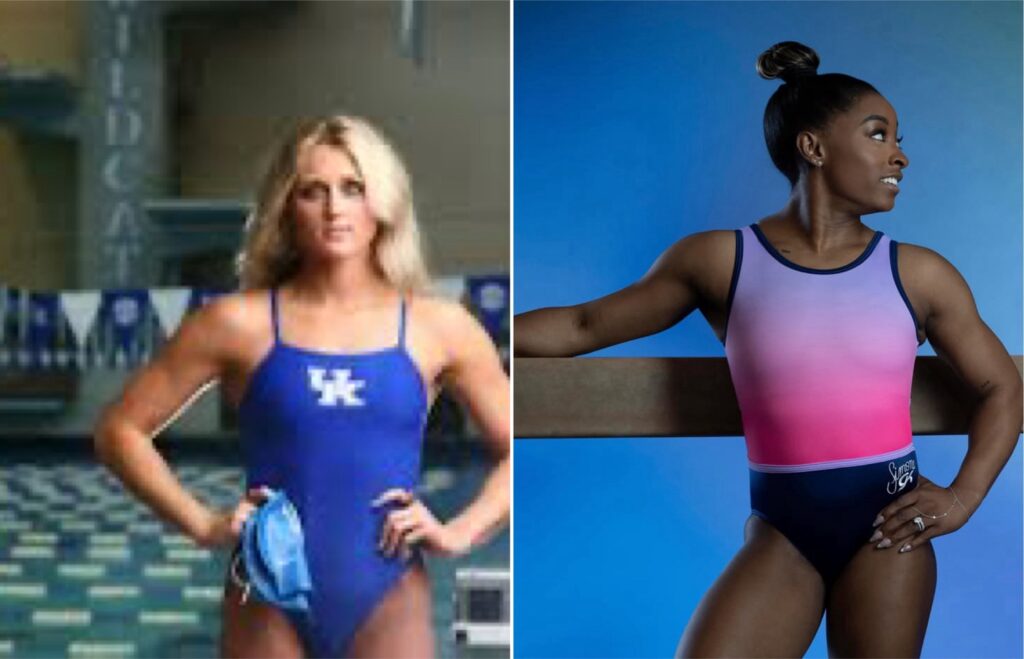NFL
Breaking News: Olympic Champion Simone Biles Labels Riley Gaines a ‘Sore Loser’ in a Heated Online Exchange Centered on Transgender Participation in Women’s Sports

Simone Biles and Riley Gaines Clash in Heated Debate Over Transgender Athletes in Sports
The world of sports was rocked today by a fiery online exchange between Olympic gymnastics legend Simone Biles and conservative activist and former swimmer Riley Gaines, centered on the contentious issue of transgender athletes’ participation in competitive sports. The dispute, which unfolded on the X platform, was triggered by Gaines’ criticism of a Minnesota high school softball team’s recent state championship win, led by transgender pitcher Marissa Rothenberger, and has since escalated into a broader debate about fairness, inclusion, and the future of gender policies in athletics.

The Spark: A Championship and a Comment
The controversy began on June 6, 2025, when the Minnesota State High School League celebrated Champlin Park High School’s first-ever softball state championship, a victory sealed by Rothenberger’s dominant pitching performance. Riley Gaines, a former NCAA swimmer known for her outspoken stance against transgender women competing in women’s sports, took to X to comment on the win, writing, “Comments off lol. To be expected when your star player is a boy,” referring to Rothenberger’s transgender identity. The remark quickly drew attention, reigniting a debate that has simmered since Gaines’ own 2021 NCAA swimming championship tie with transgender swimmer Lia Thomas.
Enter Simone Biles, the most decorated gymnast in history with seven Olympic medals, who responded with a scathing rebuke. In a series of posts, Biles labeled Gaines a “straight-up sore loser,” accusing her of bullying the transgender community. “You’re truly sick, all of this campaigning because you lost a race,” Biles wrote, before suggesting a constructive solution: “You should be uplifting the trans community and perhaps finding a way to make sports inclusive OR creating a new avenue where trans feel safe in sports. Maybe a transgender category IN ALL sports!!” She concluded with a personal jab, telling Gaines to “bully someone your own size, which would ironically be a male.”
A Clash of Perspectives
The exchange highlights a deepening divide in the sports world. Biles, leveraging her platform as a global icon, advocates for inclusivity, aligning her stance with emerging discussions within the International Olympic Committee (IOC). In a 2023 framework, the IOC proposed exploring tailored categories to ensure fairness and inclusion, though no peer-reviewed studies have yet confirmed the practicality of such a system across diverse sports. Biles’ suggestion of a transgender category reflects this evolving dialogue, though it remains a polarizing idea.
Gaines, on the other hand, doubled down on her position, calling Biles’ response “so disappointing.” In a sharp retort, she argued, “It’s not my job or the job of any woman to figure out how to include men in our spaces. You can uplift men stealing championships in women’s sports with YOUR platform. Men don’t belong in women’s sports and I say that with my full chest.” She further dismissed Biles’ comments as unexpected, quipping, “Simone Biles being a male-apologist at the expense of young girls’ dreams? Didn’t have that on my bingo card.”
The disagreement taps into a broader cultural and scientific debate. A 2022 study in the Journal of Sports Sciences found that transgender women may retain physiological advantages post-transition, such as greater muscle mass, which could influence performance in sports like swimming and softball. Conversely, research from Frontiers in Sports and Active Living (2023) suggests that hormone therapy can mitigate some differences, though the extent varies by sport and individual. With only 15% of U.S. states having clear regulations on transgender participation per a 2024 NCAA report, the lack of consensus fuels such high-profile clashes.
Context and Implications
This isn’t the first time Gaines has been at the center of the transgender sports debate. Her 2021 tie with Lia Thomas, who became the first openly transgender woman to win an NCAA Division I national title, catalyzed her activism. Biles, meanwhile, brings her unparalleled credibility as a four-time Olympic gold medalist to the conversation, amplifying the issue’s visibility. The timing—coinciding with the Minnesota championship—underscores the growing presence of transgender athletes in amateur sports, with cases like Rothenberger’s becoming lightning rods for policy discussions.
The IOC’s 2023 framework, developed with input from hundreds of athletes including cisgender and transgender women, prioritizes fairness alongside inclusion, suggesting that sports bodies could establish eligibility criteria based on evidence. However, the rarity of transgender Olympians—less than 0.001% of recent participants—contrasts with the outsized attention the issue receives, as noted in a 2023 Frontiers article. This discrepancy may explain the intensity of the Biles-Gaines feud, which blends personal animosity with ideological differences.
Reactions and the Road Ahead
Social media erupted following the exchange, with fans and commentators split along predictable lines. Supporters of Biles praised her call for inclusivity, while Gaines’ backers lauded her defense of women’s sports. The debate has also drawn attention to practical challenges, such as the feasibility of separate transgender categories and the need for standardized medical guidelines—a topic the IOC continues to study.
on June 7, 2025, no resolution is in sight. The clash between Biles and Gaines underscores a pivotal moment for sports governance, where science, policy, and personal beliefs intersect. Whether this leads to new categories, stricter regulations, or continued contention, one thing is clear: the conversation about transgender athletes in sports is far from over.












